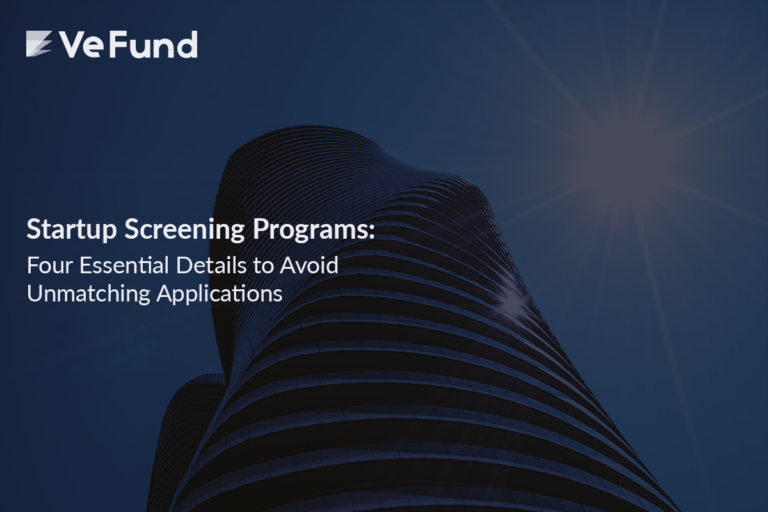Four Essential Factors Early-stage Investors Use to Select Startups
The criteria for selecting startups can take many forms. With multiple factors to categorize startups, we can form several combinations and frameworks to rank and shortlist subject startups.
Our aim in this article is to discuss the four highly essential factors that almost every successful investor uses. Whether the investor here is a business angel, accelerator, incubator, or venture capital in general, these factors are critical to the success of every early-stage startup.
Although these factors can be tested during the whole selection process, we highly recommend assessing them in the initial screening application. This will be a huge time saver for your whole selection process, making sure you spend the time with the startups with the most potential.
With that in mind, let’s dive right in.
Factor 1: Team
A large number of investors do invest to be part of the next Google. If this is your goal, you should be expecting a LOT from the founders. These founders should be able to launch the initial product and get the startup from nothing to a place with high traction. They need to find and attract talents to join the team. They also must be able to manage and lead tens, hundreds, or hopefully thousands of employees. Basically, they have to be outstanding builders, sellers, and leaders. When you look at them, you should be able to see a team with the potential to reshape the future.
As we see, measuring the founding team’s strength comes on top of the list. Throughout the process, not just the initial screening phase, the team’s strength has to be measured over and over.
Our focus here is the application phase. We will illustrate a few questions that will measure some critical key points. Since this phase is mostly MCQ and written questions, we can leave the soft skills such as leadership for later stages.
Examples for Team Questions:
- What is the time commitment of the founders? (Full-time, part-time, … etc)
- How long have the founders worked together?
- Do any of the founders have entrepreneurial experience?
- Does the core team have all the necessary technical skills? Do you outsource tasks?
- How many years of relevant industry experience does the team collectively have?
- What is the core team’s managerial background?
- What is the core team’s technical background?
For later stages after the application stage, check out this Forbes article.
Factor 2: Product & Business Model
Here you are collecting information about the current, and expected, product and the expected profit. Not every question here has to be for ranking or ruling out the startup. Your goal is to understand the startup’s product, its current status, and the business model.
Examples for Product & Business Model Questions:
- Which customers do you serve? (B2B, B2C, … etc)
- What is your business model? (subscription, commission, …etc)
- What problem does your startup solve?
- Is the product scalable?
- If you already have customers, what is their feedback?
- If you already have customers, what is their loyalty level?
- How do you differentiate from the competition?
- Are you generating revenue?
- What are the current planned key milestones for the product?
- Do you plan to expand internationally?
Factor 3: Market & Competition
Asking questions about the market and the competition scene serves two goals:
- Gaining information about the startup’s environment and its attractiveness.
- Measuring how much the founders know about their own startup’s environment.
Of course, you will need to conduct your own research later on before committing to an investment. However, the applicant’s answers will serve as a check for the attractiveness of the market’s state.
Examples for Market & Competition:
- What is your base country?
- Which countries are you targeting as your base customers?
- What is the startup’s industry?
- What is the state of demand for your product?
- What is the product’s total addressable market (TAM)?
- What is the industry’s annual growth rate?
- What is the current competition scene in the local market?
- What is the current competition scene in the global market?
- How much is the barrier to entry in this market?
- Who are your direct competitors?
Factor 4: Plan for Exit
It is critical to be on the same page with the founders on the plan for exiting. The plan may change in the long run, but being aligned with the founders is a must for a healthy investor-founder relationship.
Startups come in shapes. Some founders plan to make the next Google. Others want to sell their company in 5-10 years to a larger company. You need to make sure the founders’ plans match your investment goals.
Examples for Plan to Exit:
- Do you have an exit strategy?
- My/our investment plan is to … How does this match your plans?
Conclusion
We discussed four of the most essential factors to ask in the application phase for your initial screening. Some of these questions’ purpose is to understand the applied startup’s core idea. Other questions are to assess the startup’s strength and potential for survivability. Together, these questions help you rule out startups that don’t match your investment preferences and startups with low potential, saving a ton of time.
To save even more time, you can look up VeFund’s screening tool. We offer a screening platform for you to create your branded account. You can create your investment programs and receive & analyze applications smoothly. You can also use our VeFund’s survivability index: a machine learning tool to rank the applied startups based on the potential for survivability. Join us and make your next investment with us.







